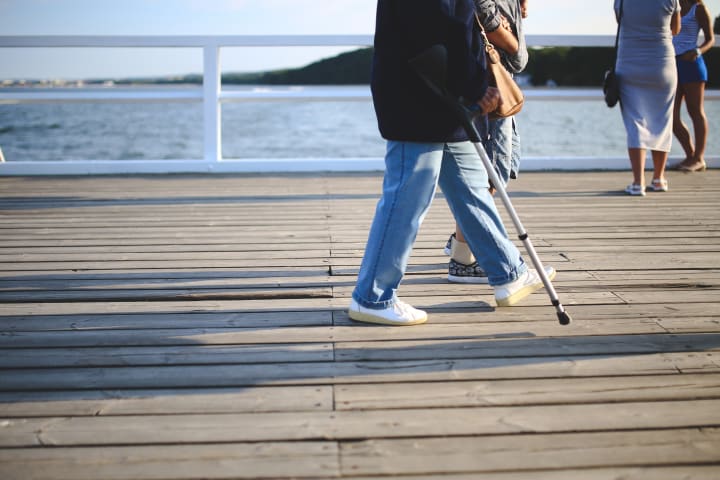
Myalgic Encephalomyelitis (M.E.) is a long-term, chronic, regularly fluctuating neurological condition which causes numerous symptoms affecting every system in the body. M.E. is also commonly known as Chronic Fatigue Syndrome (CFS), Post Viral Fatigue Syndrome (PVFS) and Chronic Fatigue Immune Dysfunction Syndrome (CFIDS). These are all the same illness. M.E. mainly, but not solely, affects the nervous and immune systems. M.E. currently affects an estimated 250,000 people in the UK, and around 17 million people worldwide.
It's just tiredness though, right?

As well as the additional symptoms from the disorder itself, sufferers can also experience anxiety and depression as a result of the disorder.
No. M.E. is not just tiredness, and this is a very common misconception. Myself, as an M.E sufferer, I experience extremely debilitating pain (mainly of the joints and muscles) which can be bad enough to cause insomnia, disordered sleep as a result, gastric disturbances, poor memory and concentration are almost guaranteed and post-exertional malaise—the body and brain’s inability to recover after expending even small amounts of energy, for example, after watching television or spending an hour at a children's birthday party which others could spend seven hours at.
Not all of us with M.E. experience the same symptoms. In fact, the symptoms we experience can be quite dramatically different. Comparing one person with M.E. to another person who has the same illness could result in two completely different comparisons. One of the most difficult things when speaking to other M.E. sufferers is that I find, actually, some of them don't experience my symptoms and, in fact, I don't experience all of theirs. This can make things much more difficult when we try and find other people suffering with the illness to relate to. M.E. can vary so enormously. Sufferers can have different symptoms, different lengths of illness, different mobility needs, different care needs, and dramatically different treatment plans.
Many people living with M.E. can suffer from other mental illness as a result—including, but not limited to, social isolation and depression. Chronic illnesses and depression often go hand-in-hand. M.E. has the potential to leave sufferers bedridden, so I would hope that can explain why some of us often feel isolated and depressed.
Who does M.E. affect?

CFS can affect people of all ages. Patients have been treated from as young as three years old.
M.E. can affect anyone of any age. This can mean that, in a large number of sufferers, lives can be changed quite dramatically. For myself, I suffered from the age of 15 which meant that schooling was disrupted—I was partly hospital educated and I never finished my higher education. For others, they may be lucky enough to either finish their education to a standard they are happy with or they may not be affected until adulthood. In adult sufferers, work is however likely to be affected instead. Being an illness which is still so misunderstood and new, employers unfortunately don't understand M.E. like they would migraines or epilepsy. This makes employers even more reluctant to be lenient, and the fluctuation of the disease can make absence prediction difficult and all the more make employers hate us, really. Employment can become impossible for many sufferers—especially when sufferers can become housebound or confined to bed for months or even years.
I guess you're probably thinking, can't someone with M.E. who is determined enough continue a normal life? It's not quite as simple as that. Leaving education at 17, I attempted a full-time business apprenticeship. I didn't succeed. As much as I wanted to attend every day, and I loved the job, I couldn't. The thing with M.E. is even if you feel well enough one day to attend a 7.5 hour day at work, you won't necessarily feel unwell until after you've already done it. This is a great example of post-exertional malaise. Just two 7.5 hour days of that job had me out of work sick for 6 months. Although an M.E. sufferer may look or feel well enough to complete a big task, the wrath of PEM to follow should never be underestimated or overlooked.
What's the treatment? Can't you just sleep?

Currently, there is no cure for M.E.
Unfortunately, M.E. has no cure at the present time. I really wish it did. Many doctors, professionals, and researchers are still trying to understand the illness itself, and without the understanding of why we have this illness, it could be a challenge to cure. Treatment at the moment for many is focused on alleviating your symptoms. At present, many facilities attempt to develop alongside the patient a personalised treatment plan for the patient, which could include medical team made up of rehabilitation specialists, mental health professionals, and physical or exercise therapists. I currently see a clinical psychologist, but she does so much more than just this. She currently facilitates my whole treatment. With M.E. it can be rare that you get to see an actual doctor. Why? Because there's nothing they can do. There's no cure for M.E.—in our case, the best people who can treat us at present are actually other allied health professionals.
Many may ask: Can't you just sleep? The problem is tiredness, right? NO! Yes, lifestyle changes can help. We may find benefit from behavioural changes, such as getting a good night’s sleep (ideally eight to nine hours per night), but, unfortunately, this doesn't cure our illness. Many with M.E. no longer feel refreshed after sleep. Eating a well-balanced diet and exercising (this one can understandably be difficult, though) can also help prevent M.E. symptoms—but again, no cure.
One thing I can tell you is that no two M.E. treatment plans look the same, ever. Treatment for M.E. is so specific, right down to how many minutes a day you spend on your feet to how many hours you sleep, spend in bed, spend with family, and it's very much a build-up game. Treatment isn't instant, if at all even successful. Some sufferers may make exceptional progress and can recover within a matter of months, whilst other suffers may remain unwell with the disease for years and may never recover before death. Many sufferers will find that they will never return completely to how they felt before illness—however usually, we are lucky enough to recover enough to lead a good life and fulfill our wishes.
Do people with M.E. really need wheelchairs and mobility aids?

Many with M.E. need to use mobility aids.
The simple answer—yes. A lot of the time, these may be used as more of a preventative measure to PEM or pain, or to last through something we really need to do. For some, it's even part of a treatment plan. Treatment at present involves conserving energy as much as managing a flare and PEM, and therefore a specialist may recommend mobility aids. M.E. is recognised as a disability and sufferers may qualify for Disability Living Allowance, Personal Independence Payment or even a Disabled Badge, but this is just a whole new struggle we go through.
What is the best advice you could give to a fellow sufferer?

Many with M.E. may have a limited quality of life.
Enjoy every minute. We may suffer a lot, an awful lot, and it's important to access all the help and support you can and the best specialist in your area, but ultimately, do what's best for you (always!) and enjoy the positives. We may have our down days, we may struggle, and we may even be bed bound from time to time, but we can be happy. M.E. won't beat us.






Comments
There are no comments for this story
Be the first to respond and start the conversation.